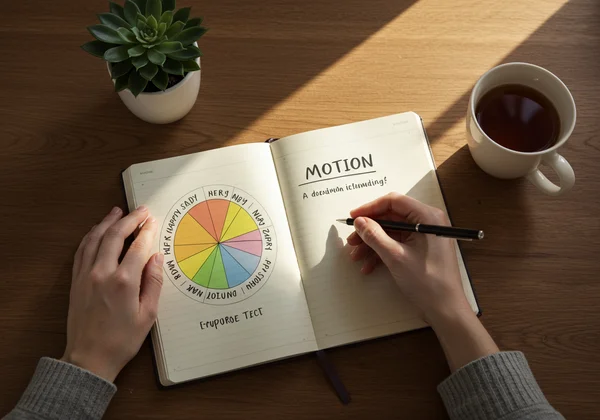Online Alexithymia Test for Adults
August 26, 2025 | By Caleb Sterling
Have you ever been asked, "How are you feeling?" and found yourself at a complete loss for words? Do you sense emotions bubbling under the surface but struggle to name them or understand what they mean? You are not alone. This experience is more common than you might think, and taking an alexithymia test can be a powerful first step toward clarity. How do you tell if you have alexithymia? This comprehensive guide will explore the signs, the science, and how a specialized online tool can help you begin a journey of self-discovery.
Feeling a disconnect from your emotions can be confusing and isolating. It can impact your relationships, your decision-making, and your overall sense of self. But understanding this pattern is not about finding a flaw; it's about gaining a new lens through which to view your inner world. If you're ready to explore your emotional landscape, a reliable online alexithymia test can provide valuable insights.
What is Alexithymia, Really?
Alexithymia, derived from Greek roots meaning "no words for emotions," isn't a mental health disorder. Instead, it's considered a personality trait or a subclinical phenomenon characterized by significant difficulty in the cognitive processing of emotions. People with high alexithymic traits struggle with identifying, describing, and distinguishing between their feelings and the bodily sensations that accompany them.
Think of it this way: while some people experience emotions in high-definition color with a full vocabulary to match, those with alexithymia might experience them in muted tones, with the "subtitles" turned off. This doesn't mean they don't feel—they absolutely do—but the connection between the feeling and the conscious understanding of it is weak. This can lead to a more externally-oriented thinking style, focusing on facts and logistics rather than internal states.

The Core Features of Alexithymia
Psychologists typically identify several core components of this trait. Understanding these can help you recognize if they resonate with your own experience.
- Difficulty Identifying Feelings: A persistent challenge in recognizing what specific emotion you are experiencing.
- Difficulty Describing Feelings: Struggling to find the right words to explain your emotional state to others.
- Externally-Oriented Thinking: A tendency to focus on external events and details rather than internal thoughts and feelings.
- Limited Imagination: A reduced capacity for fantasy, daydreaming, and imagining oneself in emotional scenarios.
It's important to remember that alexithymia exists on a spectrum. Everyone has moments of emotional confusion, but for some, it's a consistent pattern of life. An alexithymia questionnaire can help determine where you might fall on this spectrum.
Common Signs and Alexithymia Symptoms
How does this trait manifest in daily life? While the experience is unique to each individual, there are common signs that may indicate high traits of alexithymia. Many people, like Jordan from our user examples, feel "awkward" in emotional conversations or get told they seem distant.
Here are some common indicators:
- Feeling "Blank" or Confused: When asked about your feelings, your mind may go blank, or you might confuse emotions like anger and anxiety.
- Physical Complaints: You might describe emotional distress in terms of physical symptoms, like a "knot in the stomach" or a "racing heart," without connecting it to an emotion.
- Appearing Unemotional or Detached: Others may perceive you as stoic, aloof, or lacking empathy, even if you care deeply.
- Logical Problem-Solving for Emotional Issues: Your default response to an emotional problem (yours or someone else's) is to look for a practical, logical solution rather than engaging with the feelings involved.
- Difficulty in Relationships: You might struggle with intimacy and connection because expressing and understanding emotions is key to building deep bonds, a common concern for those dating someone with alexithymia.
If these points sound familiar, you might benefit from exploring them further. A scientifically-informed alexithymia test for adults is designed to assess these very characteristics in a structured way.
Who Should Consider an Online Alexithymia Test?
Anyone curious about their emotional processing can benefit from taking an assessment. However, it's particularly helpful for certain groups who are often looking for answers.
The Self-Explorer
Like Jordan, you might simply feel "different" in how you handle emotions. You're not necessarily in distress, but you have a nagging curiosity about why you feel disconnected. An online alexithymia test is a private, low-pressure way to gain self-awareness and improve your interpersonal relationships.
The Neurodivergent Individual
There is a well-documented link between alexithymia and autism (ASD) as well as ADHD. Many neurodivergent individuals find it hard to untangle which challenges come from their primary diagnosis and which might be related to alexithymia. A dedicated test can provide clarity and help tailor coping strategies that work for your unique neurotype. If you identify as a neurodivergent person, this self-exploration tool could be especially illuminating.
The Person in Therapy
For individuals like Chris, who are in therapy for conditions like depression or anxiety, alexithymia can be a hidden barrier to progress. If you find it hard to articulate your feelings to your therapist, an alexithymia test results report can become a valuable tool to facilitate discussion and guide the therapeutic process.
How Our Scientifically-Informed Test Works
Navigating the world of online quizzes can be tricky, but it's crucial to use a tool grounded in psychological science. Our alexithymia test is designed to provide a reliable and insightful experience.
The questionnaire is based on established psychological constructs, drawing from concepts found in well-regarded scales like the Toronto Alexithymia Scale (TAS-20) and the Online Alexithymia Questionnaire (OAQ-G2). This foundation ensures the questions are relevant and meaningful for assessing alexithymic traits. The process is simple: you'll answer a series of questions about your experiences with feelings and thoughts.
Upon completion, you have two options. You can receive an immediate summary score for a quick snapshot of your emotional awareness profile. This gives you a baseline understanding right away. For a deeper dive, you can proceed to our unique AI-powered analysis. This is where our tool truly shines.
Beyond the Score: Your AI-Personalized Report
A number is just a number. True understanding comes from context and actionable advice. That's why we developed our exclusive AI Personalized Report. By providing a little more anonymous situational information, you unlock a comprehensive analysis that goes far beyond a simple score.

Your personalized report will include:
- Detailed Trait Analysis: An in-depth look at your specific challenges and strengths related to emotional processing.
- Impact on Daily Life: Concrete examples of how your traits might affect your relationships, work, and well-being.
- Actionable Recommendations: Tailored suggestions and strategies you can start using immediately to build greater emotional literacy and improve your connections with others.
This dual-track system empowers you. Whether you need a quick check-in or a detailed roadmap, our platform supports your unique journey. Ready to see what you can learn? Take the free test today.
Frequently Asked Questions
Can you self-diagnose alexithymia?
No, you cannot formally self-diagnose alexithymia. It is a psychological construct, not a clinical diagnosis listed in the DSM-5. An alexithymia test like ours is a screening or self-assessment tool designed for self-exploration and informational purposes. It can help you identify traits and tendencies, but it is not a substitute for a professional evaluation by a qualified psychologist or therapist.
Is alexithymia part of autism?
While they are strongly correlated, alexithymia is not inherently a part of autism. Research suggests that a significant percentage of autistic individuals (around 50%) also have alexithymia. However, you can be autistic without having alexithymia, and you can have alexithymia without being autistic. Our assessment tool can help differentiate these experiences.
What is a high score on the alexithymia test?
Scoring systems vary between different tests. On our platform, your results are presented with clear interpretations that explain what your score means. Generally, a higher score indicates more pronounced alexithymic traits, suggesting greater difficulty with identifying and describing emotions. The detailed AI report gives you the full context behind your alexithymia test scoring.
How do you fix alexithymia?
Since it's a trait and not a disease, "fixing" isn't the right word. A better goal is to "manage" or "improve" your emotional skills. This is absolutely possible! Therapies like Cognitive Behavioral Therapy (CBT), mindfulness practices, and skill-building exercises like emotion journaling can be highly effective. Our AI report provides a great starting point with personalized coping strategies.

Your Path to Emotional Clarity Starts Here
Understanding your relationship with your emotions is a profound journey of self-discovery. Recognizing that you might have high traits of alexithymia is not a label to fear, but a key that can unlock new ways of connecting with yourself and others. It provides a name for a lifelong feeling and a pathway toward growth.
This knowledge empowers you to seek the right strategies, communicate your needs more effectively, and build a richer, more fulfilling life. Our goal is to make that exploration easier and more accessible for everyone.
Are you ready to take the first step? Discover your emotional profile with our free, confidential, and scientifically-informed alexithymia test. Start your journey now.